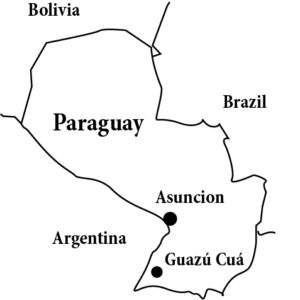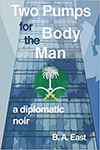Review — SHADE OF THE PARAISO by Mark Salvatore (Paraguay)
 Shade of the Paraiso: Two Years in Paraguay, South America – A Memoir
Shade of the Paraiso: Two Years in Paraguay, South America – A Memoir
by Mark Salvatore (Paraguay 1989–91)
Melbourne: Vine Leaves Press
April 2018
292 pages
$14.99 (paperback)
Reviewed by Ben East (Malawi 1996–98)
•
MARK SALVATORE writes simple, declarative sentences.
His Peace Corps memoir, Shade of the Paraiso, is stripped to fact and detail, observation and truth. Even its replication of time — passing slowly at first, building inexorably over months, then racing quickly to its conclusion — makes the narrative foremost a work of literary control.
It’s an art, how much the writer reveals of his existence in rural Paraguay — all the while revealing little of his own true emotions.
The closest we get to knowing Salvatore is to appreciate his obvious fortitude in the face of familiar Peace Corps challenges: the petty counterpart; the bullying ‘big-man’; the general estrangement from community; the recurring uncertainty. Even the elements, wind and rain and mud, conspire against him.
We experience these things, but rarely learn how Salvatore feels about them. Exhibit A, this passage about his garden:
I finished and seeded the soil of two tablones on a warm, clear day with a wind from the east. I planted garlic, onions, parsley, carrots, green chili, bell peppers, and tomatoes.
Soon after . . .
I hauled water from the well to my bathroom and took a bucket bath. I sat in my room and listened to the “Voice of America” on my short-wave radio. Two candles burnt on the table.
Soon after . . .
I couldn’t read so I crawled beneath the mosquito net and slept. I awoke to a steady rain and looked out the window at my garden. Chickens scratched and pecked for seeds on my muddy, destroyed tablones.
Disappointment? Disgust? Despair or anger at the bad fortune? If these exist, they go unreported. Salvatore rolls up his sleeves (and his pants legs) to rebuild the garden beds.
 Salvatore’s Health/Sanitation training group arrives in-country on the day of a coup that ended Alfredo Stroessner’s repressive 35-year dictatorship. He soon finds himself in the rural community of Guazú Cuá (roughly ‘the place of deer’ in Guaraní), where he conducts a census and maps the site to learn the community’s needs. The town includes 800 residents and two buildings: a three-block school house and a health center. It’s a wonder the remote population, emerging from decades of repression, accept the foreign agent in their midst at all. Some do, some do not.
Salvatore’s Health/Sanitation training group arrives in-country on the day of a coup that ended Alfredo Stroessner’s repressive 35-year dictatorship. He soon finds himself in the rural community of Guazú Cuá (roughly ‘the place of deer’ in Guaraní), where he conducts a census and maps the site to learn the community’s needs. The town includes 800 residents and two buildings: a three-block school house and a health center. It’s a wonder the remote population, emerging from decades of repression, accept the foreign agent in their midst at all. Some do, some do not.
An imperious GTZ* doctor orders him to fumigate homes with a pesticide of unverified safety. The local headmistress publicly redresses him over money, then reports him to Peace Corps HQ via telegram. The road turns to impassable mud in the churning rains. The guy who promises material to construct ovens for the local community reveals that for months he’s been sitting on his hands. How does Salvatore react?
I walked toward the center of Sapucaí, my ears burning.
The burning sensation is the pinnacle of his expressed emotion.
With steady uncoiling, Salvatore’s memoir lays out the hard realities of rural life, revealing what most Volunteers come to learn. No project completes itself. Change requires more than just a dedicated change agent. It requires relationships forged with the community. For Salvatore, those relationships become the most personal any man can find, and lead to the culmination of his once-doomed final project.
Paraguay has a fascinating and quirky history full of ruthless leaders, unsavory foreigners, and badly-planned wars. All these and more find their way into Salvatore’s experience. He witnesses the end of a long tyranny; he marries the daughter of one Chaco War veteran, mourns the death of another; he teaches us a bit about working with the local government and with other foreigners who find themselves in the landlocked South American country.
Most of all, Shade of the Paraiso skillfully mirrors the same raw energy and commitment to immersion as the Peace Corps service it recounts. It demonstrates that, sometimes, the fastest way to get somewhere is simply to roll up your pants and start marching.
* German Technical Assistance Agency – comparable to USAID
•
 B.A. East’s first novel, Two Pumps for the Body Man, does for American diplomacy in the War on Terror what Catch-22 did for military logic in the Second World War: the enemy can’t kill us if our institutions kill us first.
B.A. East’s first novel, Two Pumps for the Body Man, does for American diplomacy in the War on Terror what Catch-22 did for military logic in the Second World War: the enemy can’t kill us if our institutions kill us first.
 His second novel, Patchworks, examines American gun culture in a similar light.
His second novel, Patchworks, examines American gun culture in a similar light.
Diplomatic and other assignments have taken him to Mexico, Ghana, Nicaragua, Saudi Arabia, Paraguay, and Malawi. He lives in Virginia with his wife (also RPCV Malawi) and two sons, publishing book reviews and commentary at www.BenEastBooks.com.
BRAVO! Excellent review all descriptive of Salvatore’s exploits….it is a good read and experience of the Peace Corp is real.
Buenisima lectura y experiencia vivido Marcos!!!! Enhorabuena y muchos éxitos valiente!!!!!
I do feel emotions such as despair, loneliness and sometimes accomplishment and joy. The way the book is written makes me feel the emotions without being told what they are. It seems like a difficult life. Bravo to all Peace Corps volunteers!